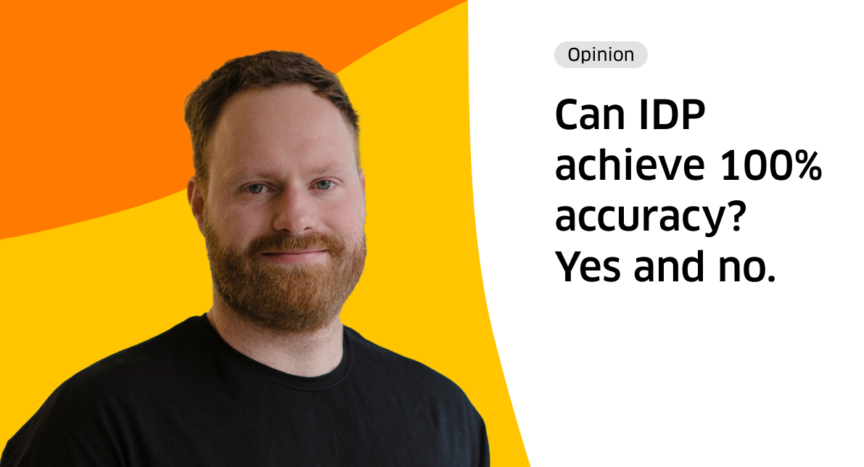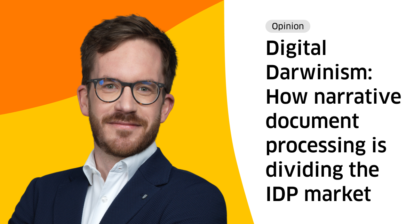Curious about what keeps experts, CEOs and other decision-makers in the Intelligent Document Processing (IDP) space on their toes? Get food for thought on IDP-related topics from the industry’s leading minds.
In this opinion piece, Tomas Gogar, Co-Founder and CEO of IDP vendor Rossum, explains why achieving 100% accuracy with an Intelligent Document Processing solution shouldn’t be the only focus.
The world of intelligent document processing (IDP) is full of promises of touch-free automation and efficiency. But a lingering question hangs in the air: can IDP ever achieve 100% accuracy? Or, as any scientist would say, at least “99.9%”. The answer, like many things in technology, is a nuanced “yes, but…”
The Accuracy Challenge: A moving target
Achieving high accuracy with AI-powered data extraction remains the IDP industry’s greatest challenge, however, it also fuels its innovation.
Even with advancements in Large Language Models (LLMs) made in 2024, the quest for perfect accuracy is an ongoing battle. While significant progress has been made – the bar has been raised and customer expectations are higher than ever before.
Here’s why achieving 100% accuracy out-of-the-box is a hurdle, even for a hypothetical Artificial General Intelligence (AGI – a machine with human-level understanding). The real world throws curveballs – documents often lack crystal-clear information. Consider a real cropped Bill of Lading below:

Can you, with absolute certainty, tell what the customer’s order number was for the supplier? If you asked this question to, let’s say, 100 people, they would either a) guess or b) say that they are not sure, but you would definitely not get 100 correct answers. That means even an AGI would struggle, resorting to a guess or, ideally, flagging its low confidence in the answer.
Unlike the controlled environment of a lab, real-world documents come in a messy mix of file formats, languages, layouts, and errors. Promising 100% accuracy out-of-the-box in this chaotic reality wouldn’t be helpful – it sets unrealistic expectations and ultimately leads to distrusting the AI.
The Power of Learning: The key to reaching high accuracy
The secret weapon in the accuracy battle? Learning. An IDP solution must, like any human employee, learn over time to understand your specific document formats, layouts, etc. In our example above, it learns that purchase orders of this specific customer always begin with “ROS”. This contextual knowledge empowers the system to excel and become more accurate over time.
So, can IDP achieve 100% accuracy? Theoretically, yes, but with a crucial caveat – it needs to learn. When we set out to build Rossum Aurora, our next-generation AI engine, we focused on creating a ‘living’ platform that evolves with users’ needs and expectations rather than forcing them to adapt.
The Perfect IDP Solution: A vision for the future
What does the ideal IDP system look like? Here’s a glimpse:
- Superhuman out-of-the-box accuracy: Imagine an IDP system that tackles clear-cutcases better than humans. Why better than humans? It simply doesn’t get tired (most human mistakes don’t come from the inability to understand but from lack of stamina or focus over time)
- Confidence awareness: The ability of the AI to identify ambiguous documents and flag them for further investigation and review. This investigation can also be carried out by an AI system, a system that has access to a wider historical context (Human analogy is – a new employee asks their more senior colleague)
- The perpetual learner: An IDP system that continuously improves its accuracy by incorporating feedback.
This vision, I believe, is achievable within the next 2-5 years.
However, achieving 100% accuracy in basic data capture is just the first step. The next frontier? Transforming captured data into actionable insights – a topic that I’ll explore at another time.
One key thing to remember is that the pursuit of 100% accuracy shouldn’t be the sole focus. Even with perfect data capture, the true value lies in unlocking insights. Imagine an IDP system that not only reads an invoice but also identifies potential procurement improvements or risky anomalous transactions. This is the future of IDP – a future where accuracy is the foundation for deeper business intelligence.

About the Author
Tomas Gogar is the CEO and Co-Founder of Rossum, a cloud-native Intelligent Document Processing (IDP) solution. A Czech Republic native, Tomas grew up in a small town outside of Prague, achieving his Bachelor’s degree in software engineering and Master’s in Artificial Intelligence (AI) from Czech Technical University. He pursued his first start-up shortly afterward and founded Rossum in 2017. Once named to Forbes’ 30 under 30 list, Tomas’ knowledge of the AI technology market is extensive and he has a particular interest in sharing his point of view on the importance of using advanced technology, like AI, to solve practical company problems that are often the root of inefficiencies in the workforce.
📨Get IDP industry news, distilled into 5 minutes or less, once a week. Delivered straight to your inbox:







